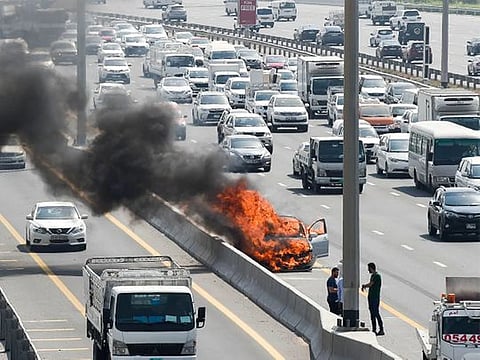Safe Summer campaign launched to tackle rising vehicle fire risks in UAE
Fire extinguishers in cars now a must, not a choice, Abu Dhabi Police warn drivers

Abu Dhabi: The soaring summer temperatures in the United Arab Emirates place significant stress on vehicles, drastically increasing the risk of car fires — especially during the extended heatwave season.
Authorities are reminding motorists that having a proper fire extinguisher in their vehicle is not just about complying with 2025 police safety campaigns; it is a crucial safety measure that could save lives.
Alarming statistics
According to a 2024 report by the Traffic Department at the UAE Ministry of Interior, 43% of all vehicle fires were directly attributed to extreme summer heat.
Last year, temperatures soared to a record-breaking 52°C, resulting in 2,189 car fires reported in Abu Dhabi and Dubai alone.
These figures highlight an urgent reality: in the UAE’s harsh summer climate, car fire prevention is a matter of survival, not choice.
‘Safe Summer’ campaign
In response, the Abu Dhabi Police General Command has launched a new awareness campaign titled “Safe Summer”, aimed at educating the public about the risks of vehicle fires and encouraging proactive safety measures.
Key campaign guidelines
Avoid leaving flammable items inside the vehicle such as pressurised containers, batteries, power banks, hand sanitizers, perfumes, gas cylinders, and lighters, as exposure to sunlight can ignite them.
Perform regular vehicle maintenance.
Ensure a fire extinguisher and a first-aid kit are present in the vehicle.
Adhere to road safety rules to avoid accidents that could lead to fires.
This initiative is part of Abu Dhabi Police’s ongoing efforts to enhance public safety and protect communities from seasonal risks.
Avoid leaving these 6 items in your car
The Ministry of Interior’s Forensic Evidence Department warns that most vehicle fires stem from drivers neglecting basic safety precautions. Six key items should never be left inside your car:
Pressurized containers
Batteries and power banks
Hand sanitizers
Perfumes
Gas cylinders
Lighters
These are highly flammable and may ignite when exposed to intense heat.
Common causes of car fires
Car fires are serious incidents that can lead to significant property damage and loss of life. While some fires may occur accidentally, identifying the common causes can help prevent them:
Electrical Malfunctions: Faulty or worn-out wiring can spark fires, especially if near combustible materials like fuel or oil.
Fuel Leaks: Leaking fuel — an extremely flammable substance — can ignite when it contacts hot engine surfaces or any heat source.
Engine Overheating: Overheated engines, especially when surrounded by flammable fluids, can trigger fires. Poor cooling systems or neglected maintenance are common culprits.
Traffic Collisions: Severe accidents can damage the fuel system or electrical wiring, increasing the risk of fires.
Exhaust System Failures: A malfunctioning exhaust system may overheat and ignite nearby substances such as oil or grease.
Improper Modifications or Parts: Using substandard parts or unsafe car modifications may raise the likelihood of fire incidents.
Summer car fire prevention tips
With rising summer temperatures, it’s crucial to adopt proactive safety measures to protect your vehicle and its occupants. Here are ten practical tips:
Inspect the Fuel System Regularly: Check hoses and pumps for leaks. Replace old or cracked lines immediately.
Check the Electrical System: Look for frayed or exposed wiring. Ensure the battery is securely mounted and cables are correctly connected.
Monitor Tire Pressure: Incorrect tire pressure can cause overheating and blowouts, increasing fire risks.
Don’t Leave Flammable Materials Inside: Avoid leaving gas lighters, fuel containers, or pressurized cans in the car, especially in hot weather.
Maintain Engine and Cooling Systems: Regularly inspect the engine and ensure coolant and oil levels are within safe ranges.
Avoid High-Speed Driving in Extreme Heat: Excessive speed can overheat the engine and tires. Try to avoid driving during peak heat hours.
Fuel Up Safely: Always switch off the engine during refueling. Avoid smoking or using open flames at fuel stations.
Keep a Fire Extinguisher in the Car: A small, vehicle-approved extinguisher can help stop small fires from spreading. Learn how to use it correctly.
Park in the Shade: Parking in direct sunlight raises internal temperatures. Use sunshades or car covers where possible.
Be Alert to Strange Smells or Smoke: If you notice a burning smell or see smoke, stop immediately, turn off the engine, and seek professional help.
Fire extinguishers: A critical requirement
Having a fire extinguisher in your car is a non-negotiable safety measure. In some regions, it is also a legal requirement. According to Abu Dhabi Civil Defense Authority guidelines, different types of fire extinguishers are suitable for automotive use, with dry powder extinguishers being the most common and effective.
Types of fire extinguishers suitable for cars
Dry Powder (ABC) Extinguishers - Effective against various fire types: solid combustibles, flammable liquids, and electrical fires.
Carbon Dioxide (CO₂) Extinguishers - Ideal for electrical and liquid fires; leaves no residue.
Foam Extinguishers - Best for flammable liquid fires.
Tips for choosing the right car fire extinguisher
Size: Opt for a 1–2 kg extinguisher — sufficient for most small car fires.
Type: Choose a multi-purpose (ABC) dry powder extinguisher for broad fire protection.
Mounting: Secure the extinguisher using a bracket in an easily accessible location.
Expiration: Check the expiry date and ensure regular inspection.
Maintenance: Periodically check its pressure and condition; replace if damaged or expired.
Storage Location: Store it in an accessible place such as the glove compartment or under the front seat — not in the trunk, where access during an emergency may be difficult.


